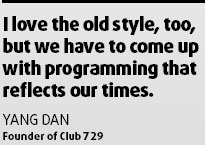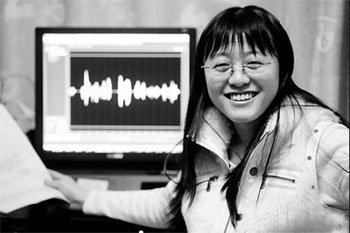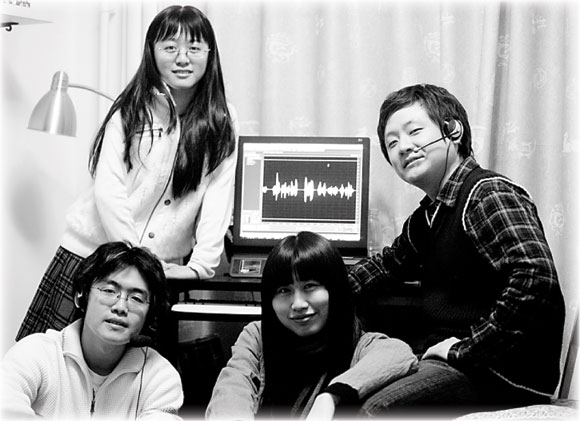Dubbing finds its voice
Vocal art usually refers to singing, but when Yang Dan talks about it she means the art of voice acting. The 24-year-old fell in love with the voice while still an elementary school student. That was when she discovered Dark Justice, a Hollywood drama series and a Japanese cartoon that were dubbed into Chinese by a group of voice actors who were based in Liaoning province.
|
Club 729 founder Yang Dan. Photos by Yang Shizhong |
Breaking several degrees of separation, the Beijing native sought them out and observed how they worked. Now, into the third year of a graduate program, she has her own voice acting club and, using "X-ray" as her online handle, is penetrating the shrouds of mystery that surround those invisible characters that entertained her via the air waves.
Club 729, which Yang founded on July 29, 2005 - hence the name - is an online community that brings together enthusiasts of voice acting, by producing their own shows. Since several of the core members live in Beijing, the work is partly conducted in the non-virtual world of a small apartment where Yang and her pals gather to talk about scripts and conduct some of the recording sessions.
Yang acts as producer and director, but "I don't give orders, everything is done by consensus."
Yang attended college as a journalism major, "where I was closest to voice acting" and is currently an intern at Beijing Radio, where she gets hands-on experience producing audio drama. The biggest influence, though, is Japanese anime.
"Our generation grew up watching Japanese cartoon shows and our fascination with dubbing springs from these programs," she says.
This differentiates Yang's club from a previous generation whose fixation on dubbing was based on the release of a wealth of imported movies in the early 1980s, at the end of the "cultural revolution" (1966-76).
"I love the old style, too, but we have to come up with programming that reflects our times," she says.
"You have to realize that dubbing is not an independent art, it is subordinate to movie and TV shows. Our generation wants more freedom, and only freedom can help us create good shows."
Yang's club does not do classic plays or poems, which is the territory of A-list voice actors, and does not produce comedies or melodrama, either.
"A radio show caters to the elderly and drivers. So, it is similar to a television drama or comedy series. Our content is distributed online and attracts a much younger crowd. Seventy percent of our listeners tune in to our webpage directly and the rest get to us by downloads."
Of the dozens of voice acting clubs active online, "ours is coming out ahead because we put a real emphasis on quality". Since all the members have day jobs, they take months to do one show or a segment for a series. For one show, she screened half a dozen actors and finally settled on a 17-year-old Chinese student in the United States - "He has a very mature voice totally belying his age."
The member responsible for post-production is a movie buff in Shanghai, who collects tons of sound effects and is particular about making everything himself.
"Usually a radio show produced by a radio station has a very simple sound design, but our shows have from 20 to 70 tracks. We're aficionados. We're not in it for the money, so we can experiment and aim for perfection," says Ketsu, who has played several male leads.

Yang's club does not have any professional equipment, but it makes do with what it's got: one computer with a microphone, plus some sound recording and mixing software.
"We record one person at a time and splice the voices as dictated by the script. It's not a sound-proof booth, but we can improve the sound quality in final mixing."
When an actor joins them from another location - be it Anhui or America, there is a great deal of instant messaging, discussion back and forth, until the role is well-defined and all the lines polished.
All the members are galvanized by the enthusiastic response they get when they put their shows online. This is a hobby just like senior citizens singing Peking opera in the park, but with a more exclusive following.
"We're not in a position to capitalize on it right now, but I'd be glad if it can take us to more steady work such as audio books and voice-over jobs," Yang says.
Besides the dozens of shows produced for netizens, the club has also recorded sound tracks for cosplays, a form of stage play where young amateurs don period costumes and play out scenarios from mostly fantasy novels.
"It's all done in the spirit of fun. There's no monetary compensation involved," Yang says.
Like most voice acting buffs, Yang is dismayed that more movies hire stars to lend their voices to animated or foreign roles. "I think it's a gimmick." But she is open-minded when the result is good. "I love Chen Peisi doing the Chinese voice for Mushu, a comic role done by Eddie Murphy in the English version of Mulan. I also love Tom Hanks in Toy Story."
Analyzing the dubbing scene in China, Yang said imported movies take priority over local television programs, which compromises the shows' quality. By aggregating resources on the Internet, she hopes she and her pals can create a new way of quality voice acting.
"That's why we don't indulge in nostalgia for the golden era of dubbing, which is long gone. We don't dream of replacing the current forms of audio shows, but we're providing a new choice."
|
Yang with the rest of Club 729 crew. |
(China Daily 01/16/2008 page20)
















